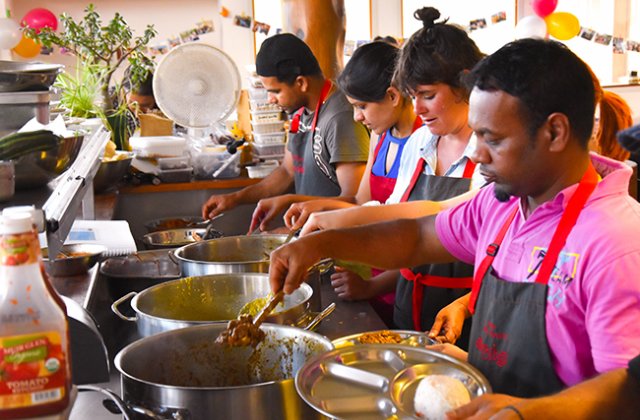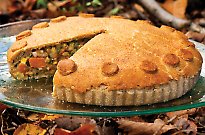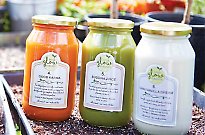
Hot plate: Tamil feasts and flavours
Hot plate: Tamil feasts and flavours

The Tamil Feast’s Experience is like no other, not only because you get to taste food you’ve never tasted before, eat with your hands (in the Tamil style) or because you’re surrounded by the natural beauty of CERES Community Environment Park. This richly authentic food experience just minutes from the Melbourne CBD is about celebrating Australia’s diverse cultural influences and supporting recently settled asylum seekers. We chat to project organiser Helen Jeisman.
Can you tell us a little about yourself and your involvement with Tamil Feasts?
I got involved with Tamil Feasts after attending a couple of feasts as a ‘feaster’ and loving the whole project from the get-go. I volunteered for six months before taking on the coordination of the project full-time. It has been a privilege getting to know the project and the people behind it so intimately.
What is a ‘Tamil Feast’?
A Tamil Feast is exactly that! It’s a three-course meal where diners feast upon a banquet of traditional Tamil cuisine made by four proud Tamil cooks: Sri, Nirma, Niro and Nigethan, all of whom are currently seeking asylum in Australia. Held three times a week, these feasts create a context in which the cooks are able to share the food heritage of their Sri Lankan homeland with the wider community. This unique enterprise creates a space in which Australians are able to show their support of individuals who are presently undergoing the difficult experience of seeking refuge in a foreign land all the while feasting on some seriously tasty food!
How did Tamil Feasts come into being? Where did it all begin?
Tamil Feasts was born while Nirma, Niro, Nigethan and Sri were all living in immigration detention. They each had been preparing food for themselves and visitors and learning recipes from their families over the phone. Their cooking skills were evident in the delicious curries and dishes they created.
A woman named Dori, who had been visiting the Tamil Feasts’ chefs while in detention, saw a real opportunity for the men to showcase their talent and gain employment while doing it. All four men were leaving detention and after many meetings, a few meals were put on in their new home of Melbourne to see what would happen. Overwhelming community support saw those dinners sell out in a matter of days and it became clear that the idea was gaining real traction. Shortly thereafter Tamil Feasts began operating once a week out of CERES Community Kitchen. We have now been operating for 18 months!
What is unique about Tamil cuisine?
The food we serve is real food made with so much love! Tamil cuisine, in general, is full of contradictions – it is bold and subtle, spicy and sweet, rich and fresh, but always balanced and never too much. We offer an experience of vibrant colour, spice and flavour of authentic Tamil curries, chutneys, dahls, masalas and hoppers.
Can you tell us the ways in which Tamil Feasts supports recently settled asylum seekers?
Food is a powerful medium for social change and bringing people together. The ongoing success of the enterprise is a true testament to this and has been a positive means of connecting and supporting people currently going through the difficult circumstances of seeking asylum. In addition to the continuing overwhelming community support, the many volunteers who dedicate their hands and their hearts week-after-week are more than just volunteers – they’ve become true friends to Sri, Nirma, Niro and Nigethan. Furthermore, gaining employment as a person seeking asylum can be extremely challenging. Tamil Feasts has been a means of income and professional development for Sri, Nirma, Niro and Nigethan.
The venue, Ceres Community Environment Park, is also quite unique. Can you tell us a little bit about CERES?
CERES Environment Park is a not-for-profit sustainability centre and urban farm that occupies 10 acres in East Brunswick. In the 1850s it was a site quarried for bluestone. 100 years later in the mid 1900s, the site was a rubbish tip and in 1982, CERES was established.
CERES is a place for community-based learning and action to create environmentally beneficial, socially just, economically satisfying, culturally enriching and spiritually nurturing ways of living together. CERES does this through both its education programs as well as through a variety of social enterprises.
Finish this sentence: Tamil Feasts is the best…at filling up hearts and tummies with love.
Tamil Feasts occur three times a week: Mondays and Tuesdays at 6:30pm, and Fridays at 7pm. Bookings are essential as their capacity is limited. For more information visit their official website for more information.















